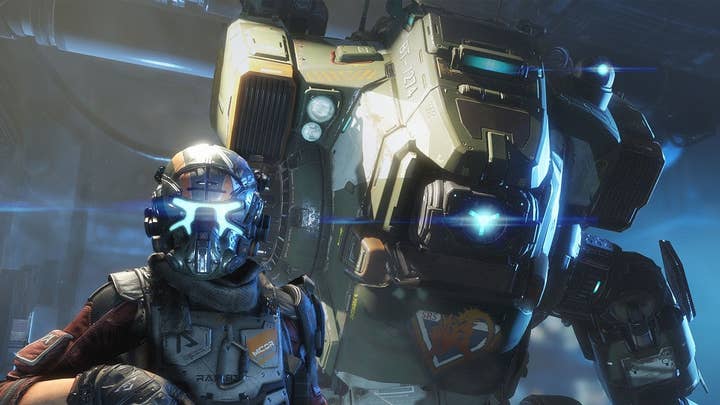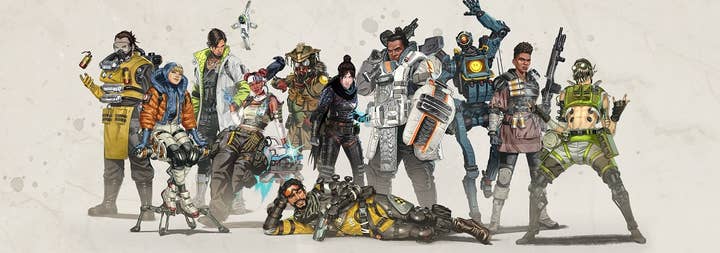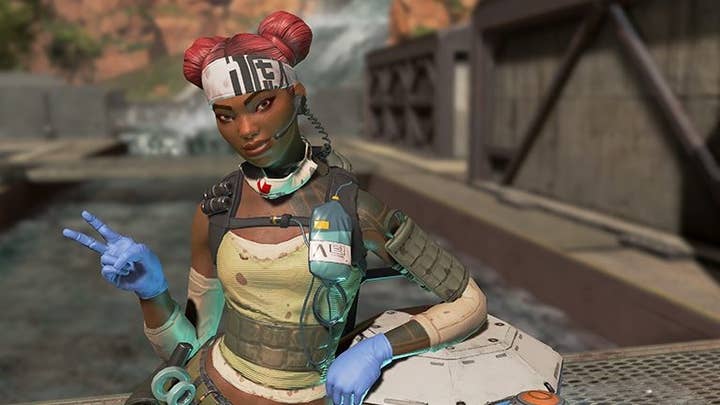What went into Apex Legends' surprise launch?
Respawn's Arturo Castro and Drew McCoy explain how they made and marketed a Titanfall game with none of the key elements of Titanfall
Apex Legends was surprising for a host of reasons, and not just because it was surprise launched on the day it was announced. The degree of the game's success -- more than 70 million players to date -- was also a surprise, as even Respawn Entertainment's senior director of brand management Arturo Castro and executive produce Drew McCoy acknowledged in a presentation at this week's Monteral International Game Summit.
As McCoy explained, he had worked with Titanfall game director Steve Fukuda to determine what aspects "define" a Titanfall game. They settled on three elements. First, there were the Titans, the game's gigantic mech suits. Second, there were the pilots, the yin to the massive titans' yang, super soldiers capable of wall-running and double-jumping their way around battlefields. Third was the Titanfall universe, which McCoy described as an unexplored sci-fi Spaghetti Western. Apex Legends incorporates essentially none of those things.

So how did it come to be? McCoy explained that in mid-2017, the team was wrapping up its post-launch support for Titanfall 2 and didn't quite know what it would work on next. They knew they wanted to do Titanfall, and had ideas for a third proper Titanfall game, but didn't know exactly what it would look like.
"The way we work is by finding the fun," McCoy said. "We don't have a game director who sits down and writes up a 500-page bible... We're like a really poorly trained dog on a walk. We just kind of sniff around. Let's follow our nose wherever we go. Whatever's fun, we'll go a bit deeper, rub our nose in it, roll around in that a little bit."
"We're like a really poorly trained dog on a walk. We just kind of sniff around"
Drew McCoy
The sniffing around process is more technically referred to as the "action block phase," in which the team works on a multitude of small prototypes that will become the building blocks for a game. Each action block prototype could be for a weapon, a level, a mechanic, or anything they want, but the point is to get it done fast. Titanfall 2 had about 150 action blocks, McCoy said.
Some Respawn developers had been interested in battle royale games, so they decided to prototype a Titanfall take on them in that action block phase.
"Immediately it was legit," McCoy said. "Every playtest got rowdier and rowdier. We were loving it, so we started investing more and more time into a battle royale mode."
Over months of prototyping, Apex Legends began to take shape, but it completely lacked the defining features of the franchise. Titans in particular simply didn't fit with the battle royale gameplay.
"We tried for months and months to make titans work in BR, but they're the antithesis of what we were trying to accomplish," McCoy said.

Battle royale games are supposed to be like poker, he said, a level playing field with an interesting random element thrown in. Titans were "a huge unbalancing force." So Titans were a no-go. On top of that, Titanfall's agile pilots were also a problem, McCoy said, because it became too difficult for players to read the battlefield.
"What happens when you can wall-run and double-jump all the time is the legibility of combat just goes to zero," McCoy said. "You can never predict where someone's going to be, or how many squads are coming around the corner, because they can go up, they can go underneath, they can go around."
"We had a game that looked a lot like Titanfall but did not fulfill that Titanfall brand promise"
Drew McCoy
As for the final core aspect of Titanfall -- the universe and lore -- Respawn was finding that the backstories and lore around Apex Legends' characters and arena battles were coming together, but there were questions on how they would fit into the existing franchise.
"We had a game that looked a lot like Titanfall but did not fulfill that Titanfall brand promise," McCoy said.
Fortunately, Castro had been working with the dev team from the start of the project, which he said was a rarity in his 11 years as a marketer in games.
"If you've been in marketing, you've probably had a few projects where the game was handed to you and you're told to figure out how to sell it. And if you've been on the development side --and I'm sure Drew has stories -- where marketing either says you should make this game because the market tells you to do it, or they have no construct of what the game is, and they're going to market it in isolation. "
But Castro had been involved from the start, and well understood the challenges and potential pitfalls involved.
"If marketers are worth anything, they're able to really understand what players' expectations are"
Arturo Castro
"Really, if marketers are worth anything, they're able to really understand what players' expectations are," Castro said. "In a rapidly changing marketplace, in a rapidly changing space of how players are consuming entertainment or any type of media, the expectations of how they consume -- and also the brands they consume -- are paramount. So really distilling that and understanding that are key."
After Titanfall 2, Castro said the expectations from players included Titans, agile pilots, and a single-player campaign, all things Apex Legends lacked.
"We had a game we believed in. We had a game that was incredibly fun, that we thought would compete in the marketplace for a variety of reasons. But it wasn't Titanfall," he said.
Castro said it would have been possible to just brand the game as Titanfall Apex and push it out the door, but believed that branding would have been a problem for some of the core Titanfall player base. He also said he could imagine an evil version of himself pushing the team to staple on a single-player mode, cram Titans into the game haphazardly and ship it, but that obviously wasn't ideal.
"Beyoncé famously drops her album, and day one it becomes a massive hit. Kanye West did the same thing... Why couldn't it work for games?"
Arturo Castro
"We knew if we were going to do this, we really just needed to rip the band-aid off," Castro said. "If we wanted to do it, this can't be branded Titanfall... We knew if we were going to do this, we had to focus in and not just make it a mode in a $60 game. If we were to do that, we would dilute the entire experience and then throw in some tacked-on modes just for value in a box.
"We knew we had to treat it as a new IP, so that means if you're a new player who's never heard of Titanfall, you can relate to the characters, this new lore we're building, this new game on face value, and make it feel new. And for players who are really into the Titanfall universe, we left connection points so it makes sense with the universe they know, but flips it on its head to create something vastly different."
"Ripping the Band-aid off" is an apt way to put it in light of the game's surprise announcement and launch. Castro knew that alienating the Titanfall core was a distinct risk with the project, and a standard six-month marketing campaign for a Titanfall game with no Titans and no single-player would have left plenty of time for that core to express (and feed) their skepticism.

Showing the game off that early also would have tipped Respawn's hand on Apex Legends gameplay innovations like the ping system (which Castro noted was promptly copied by competitors after the game did launch). On top of that, Castro admitted the marketing team was "very afraid" that with EA acquiring Respawn in late 2017, Apex Legends would be framed as the evil acquiring publisher forcing its new studio to make a battle royale game because that was the trend.
In the end, Castro said they took inspiration from Beyoncé.
"We took a big risk... If things went a little bit differently, I might not have a job now"
Arturo Castro
"In entertainment and other forms of these kind of products, the idea of long-form campaigns was being challenged," Castro said. "Beyoncé famously drops her album, and day one it becomes a massive hit. Kanye West did the same thing... Why couldn't it work for games?"
Of course, there was still plenty of work involved in pulling off a surprise launch. Respawn settled on an influencer-focused approach, and three days before launch, it flew 100 of the top influencers from around the world to Los Angeles to see the game, not telling them exactly what it would be. With the Super Bowl on the Sunday in between the event and launch, EA coordinated with the attendees to have them tease the news on their social channels during the half-time show. The results were tweets promising that the reveal would be "something that will change the industry."
Castro said Respawn head Vince Zampella's reaction to some of the clamor from those tweets was that it was "gross," akin to the hype leading up to the Fyre Festival debacle.
"Part of me was like, 'Yes, that is gross. Good call out, Vince,'" Castro acknowledged. "But what I actually thought was that's why I knew it could work, because we actually had the product to pay it off. Fyre Festival had no product. We actually had the product and the hype to build it up."
The next morning, McCoy and Zampella unveiled Apex Legends on a stream, telling people it was out now and then spending 20 minutes explaining what it actually was. By the end of the stream, Castro said Apex Legends was the top game on Twitch and trending on YouTube.
"We took a big risk, and we didn't know how this was going to land," Castro said. "If things went a little bit differently, I might not have a job now. But we took this calculated risk because we went in eyes wide open and we did our homework."
Disclosure: MIGS provided travel and accommodations for GamesIndustry.biz to attend the event.
